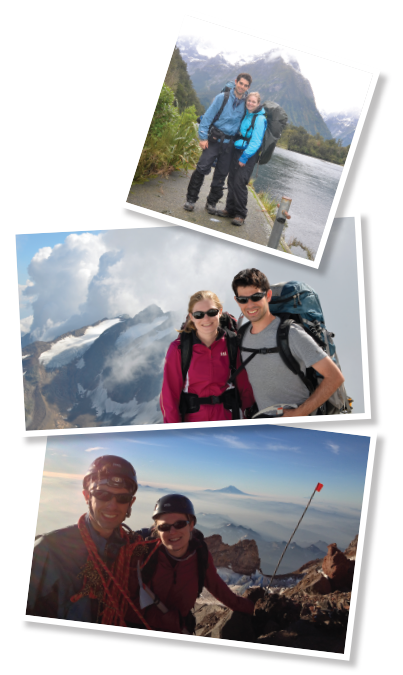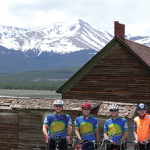In November 2017, Brit Adler, MD, an instructor in the Division of Rheumatology at Johns Hopkins University, Baltimore, was traveling across a glacier in the Cordillera Blanca mountain range in Peru. At nearly 15,000 feet high, the hikers in the caravan were secured to each other by ropes secured to harnesses. At that altitude, no oxygen was needed—just a large dose of stamina.
While glacier travel was the most memorable part of her weeklong trip, it was also the saddest. “We were supposed to spend a good four hours traveling on this glacier,” says Dr. Adler. “Unfortunately, over the past year, the glacier had largely melted. It was essentially gone. To see this glacier dying right before our eyes because of climate change was devastating.”
Dr. Adler has hiked in many exotic locations with her husband, Mark Yarchoan, MD, also an experienced hiker. Dr. Yarchoan is an assistant professor of oncology at Johns Hopkins University. They often hike with a compass and map—no human guides—sleep on cold, hard ground and believe these exhausting journeys are well worth it to experience some of the most stunning places in the world.
View from the Top

Top: Dr. Adler and Dr. Yarchoan near Milford Sound, New Zealand, in 2015.
Middle: Dr. Adler and Dr. Yarchoan backpacking in the Stubai Alps in 2013. Bottom: Dr. Adler and Dr. Yarchoan in the Stubai Alps in 2013.
Dr. Adler grew up in the San Francisco Bay Area. Her family often hiked Yosemite National Park in California’s Sierra Nevada.
Years later, hiking took a back seat to medical school. She graduated in 2012 from Case Western Reserve University, Cleveland, completed her internship the following year and residency in internal medicine in 2015, both at the Hospital of the University of Pennsylvania, Philadelphia. In 2018, she
finished her clinical and research fellowship in rheumatology at Johns Hopkins University and then joined the faculty. Last year, she also received ARHP’s Distinguished Fellow Award.
Between medical school and her residency program, Dr. Adler and her husband trekked in the Himalayas for three weeks, which soar more than 29,000 feet high. They have also backpacked several times in the Stubai Alps, which peak around 11,500 feet.
Their backpacks are usually loaded with warm, waterproof clothing, food, water, sleeping bags, a water purifier, map, compass, first aid kit, head lamp, ropes and other safety equipment, Diamox for altitude sickness, a tent if camping and, perhaps among the most important items of all, a deck of cards. Although her husband carries a much bigger load, Dr. Adler suspects her backpack weighs roughly 30 lbs.
“[The weight] makes you cut back and realize what you actually need, which is also one of the reasons why I enjoy backpacking so much,” Dr. Adler says.
Besides enjoying the fantastic scenery, she says there’s no need to worry about water. Many times, you can drink directly from a glacier after purifying the water.
Although glacier travel doesn’t require rock climbing, she says it does demand some technical expertise. She explains that, years ago, her husband and his family also hiked on glaciers with guides and completed courses in glacier travel. She has since learned many lifesaving skills and lessons from them, such as the bigger the crevasses are on the glacier, the more distance you should maintain between yourself and your rope mates.
“The goal is to keep enough of a distance between you and the person in front of you and to keep the rope taut enough so if one person falls into a crevasse, the others can arrest the individual’s fall and help the person crawl out,” says Dr. Adler.
The distance can range from 20 feet to 40 feet, so most of the time, she says, glacier travel is a solitary activity that can transform into a spiritual experience.
Unfortunately, just the opposite can occur, depending on the weather.
“Some of the scariest moments in my life have been backpacking with impending lightning storms,” says Dr. Adler. “It can be very dangerous, especially if you’re on an exposed ridge where you can become a lightning rod. That has happened to me several times, especially in Yosemite and the Stubai Alps.”
Still, she believes the benefits of hiking far outweigh the potential danger. On the trail, she has met more people from all over the world than she has during traditional sightseeing vacations. Sometimes, you may be snowed in with other hikers in a hut for a day or two. Dr. Adler says you can really make fast friends just by playing cards.



